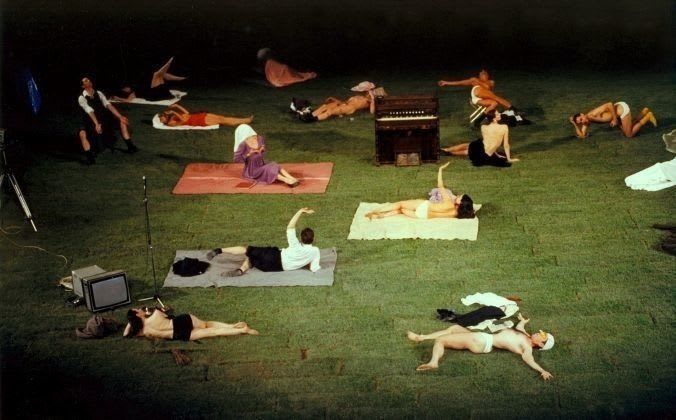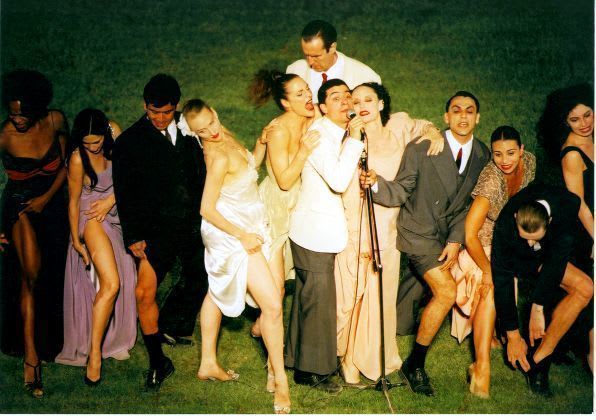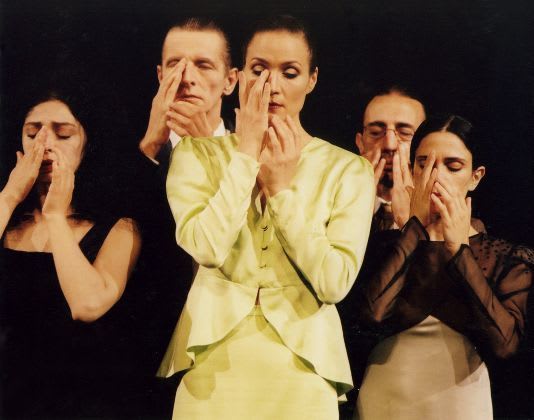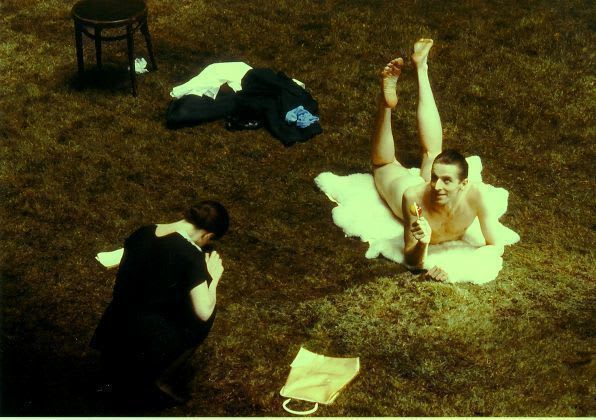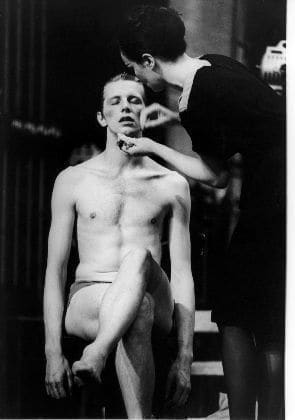It’s a mad, mad world, my friends, and who better to reflect it back at us but Pina Bausch—with tea and empathy. And a hand-jiving file of dancers weaving through the auditorium, meeting us halfway, addressing us, inviting us in. Show us your scars.
First performed in London at Sadler’s Wells in 1982, 1980—A Piece by Pina Bausch is back in this its fortieth anniversary season with the added patina of time, four of the original cast playing their younger selves.
Created as an elegy on life, following the death of her professional and life partner Ralf Borzik, ‘who played a key role in the forming of the visual style of Tanztheater’, Pina makes the intimate, the personal, universal.
Life is a surreal work of art, a disjointed Godardian jump cut compilation: Over the Rainbow, Mae West (‘a man in the house is worth two in the street’), an absurd fiction, a jumbled dream, an enigma, its depths and shallows unfathomable. Shakespeare got it right.
So did Beckett—we are all dancing on our graves, but some are having more fun than others. What constitutes a life? Memories. An album of nostalgia, a collage of remembrances, a cacophony of words, a confusion of emotions, a jockeying for position.
How dearly we hang on to memories. On a grassy meadow, stretching to the far reaches of the deep stage, watched over by a small deer, life is played out in all its untidiness.
A boy tries to find a quiet place to eat his soup, one spoonful for maman, one for papa; a girl is dressed by her papa, but he forgets her knickers; children’s games are played; poems recited—the naughty ‘I couldn’t help it’, and an ode to a chair.
A man has his baby photo taken naked on a rug, a woman is tossed in the air by six men, the emperor has no clothes, and a mature gymnast works out on parallel bars.
Line up for inspection, show us a leg, whistle a tune, repeat a tongue twister, tell us what you know about dinosaurs.
Who has had the most tragic experience? What are we afraid of? The seventeen-strong troupe confesses to lots of things. Slowly—over three hours and forty minutes—they share and reveal themselves to us, and us to ourselves. The macrocosm encapsulated in the microcosm.
Elegant gowns and suits strip off to sunbathe, each silly pose uniquely revealing. What are we but a repository of the visual and aural, strange mores, peccadilloes, rituals to get us through the day.
Hands chop onions, tears stream and are wiped away, John Dowland’s Willow song sounds as the group form a guard of honour around a space fit for a tomb.
How do we get through this? We have tea. A royal garden party, and tea for the audience—just raise your hand and you will be served politely—milk, sugar? Jelly on a plate and party games, adults ‘oh dear’ the young, and a magician performs rope tricks, distractions in our vale of foolishness.
The veneer of social life and its basic bodily functions—a man finds a space at the back to squat and do his business—finery and the child within. We accrue but do we grow up? Childish petulance, lots of love, and solemn procession—Land of Hope and Glory.
Wry, tender, stark and occasionally laugh out loud funny, Pina Bausch strips away to the core of being. Applies lipstick kisses, and make-up to a man’s face—is this the embalming process?
If this is a wake I’d like one like this. Familiar faces, some missing (and are missed), regression, remembered farewells, sweet partings, tender touch, maternal and carnal, a busy Breughel (the Elder) painting, tableaux with so much going on one knows not where to look.
One thing for certain, though—Pina’s choice of music, here including Dowland, Beethoven, Debussy, Elgar and Brahms, will be significant. An organ takes centre stage, a violinist wanders on, time is measured out, music refines the senses.
Entertaining, engrossing, not for one minute am I bored, though I suspect the Pina Bausch uninitiated might take some convincing—go on, give it a go—but the fans, like the ecstatic German visitor in front of me, don’t contain their admiration and give the Tanztheater Wuppertal a standing ovation.
Wonderful to see some of the team again: Mechthild Grossman with her surprising basso profundo voice dominating the stage (her ‘fantastic’ music hall routine is fantastic), Nazareth Panadero who has seen it all before, the effusive Helena Pikon, the diffident Barbara Kaufman, and Julia Shanahan giving it large.
My, hasn’t Ditta Miranda Jasfi come out of her shell, as have some of the other coy girls, giving us plenty of eye. Eddie Martinez is full of cheeky boyish charm. And Lutz Förster, taking over as artistic director (new works are promised), is the elder statesman not averse to dropping his trousers.
Bravissimo all—Regina Advento, Ruth Amarantes, Silvia Farias Heredia, Azusa Seyama, Julie Anne Stanzak, Tsai-Chin Yu, Fernando Suels Mendoza, Daphnis Kokkinos, Jean-Laurent Sasportes, Franko Schmidt, Michael Strecker!
The company is celebrating forty years of Tanztheater Wuppertal Pina Bausch - PINA40 - and there is much to celebrate: Pina created 46 dance theatre pieces in a career spanning 36 years.
Sadler’s Wells has named its boardroom The Pina Bausch Room in commemoration of her life.
